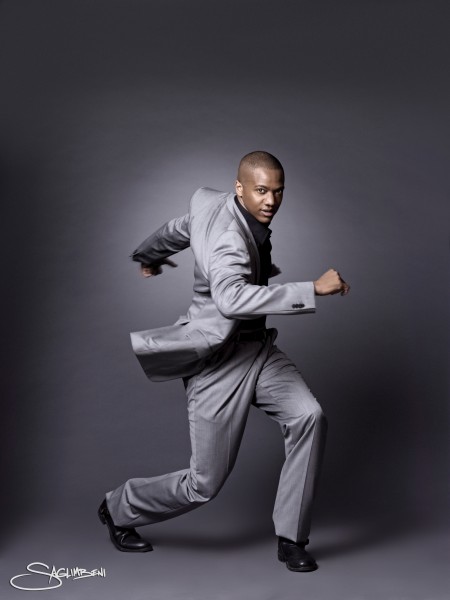
J. August Richards. Photo: Nick Saglimbimbeni, Slickforce Studio
He never followed his mother’s urging to become a doctor or a lawyer in real life, but 1995 BFA graduate J. August Richards played both professions on television as part of a busy and quite successful 2014 calendar year.
The just concluded year saw Richards play four TV roles that were completely dissimilar to each other. Richards went from the disabled but still quite dangerous Deathlok on Marvel’s Agents of S.H.I.E.L.D. to the Assistant Secretary of State on The Lottery, the highest ranking role he has ever played to date. The Bravo series Girlfriends’ Guide to Divorce finds Richards playing a gay married father of two, and he closed the year by returning to the long-running series Grey’s Anatomy” portraying the younger version of Chief of Staff Richard Webber (played as an older man by James Pickens Jr.).
“I’m really at peace with where I am in my career,” says Richards. “I enjoy my work so much, and this past year has been the highlight of my career because I have played four of the most diverse characters any actor could be asked to play..”
A native of Washington D.C., Richards set his sights on a career in television from the moment he became hooked by that magical box. As he entered his teens, he targeted Los Angeles as his destination of choice and USC as his go-to school. Why those two locales? According to Richards, Three’s Company depicted California as paradise while the lures of USC’s School of Dramatic Arts and School of Cinematic Arts offered potential proximity to a pair of luminaries: John Singleton and Steven Spielberg.
“I was either going to be a film major or a theatre major,” Richards explains. “When I found out that film students didn’t get to make movies until their junior year, I decided to be a theatre major because I really wanted to get right to my career.”
A recipient of multiple scholarships including the LeVar Burton Scholarship and through the Black Student Assembly, Richards plunged right in, working with such instructors as Anna Stramese, Timothy Douglas and Allan Hendrick. The classical foundation he received at SDA would prove essential in preparing Richards for roles in, of all things, science fiction.
“The program was exceptional,” says Richards. “Once you have had to play a Russian aristocrat in 1854 and you have to make his wants and needs your own, you can do that with anything. I feel like a good portion of my work has been in the science fiction genre because of Chekhov because of Shakespeare, because I had to take these words and circumstances and make them my own.”
Dayna Lynne North, a cinema alum, remembers walking into a rehearsal hall as Richards was rehearsing a performance for an evening of soul and being struck by a monologue that Richards was delivering before she even set eyes on him.
“I was already kind of star struck by this guy I hadn’t even met,” says North who became a longtime friend and would work with Richards both at USC and as a TV writer and producer. “He wasn’t a star at 18, but he has continued to grow and flourish as an actor and as a director. I continue to be impressed by him.”
As his college career was drawing to a close, Richards remained on campus an extra year serving as a resident hall advisor in on-campus housing. During that extra year, Richards auditioned, but did not book a single job. Just as his tenure as an RA was ending, he booked a gig on a touring educational science show called Chemipalooza.
“That kind of boosted my confidence and I sort of started working ever since,” Richards says.
His breakthrough role — and the one that allowed Richards to pay off his student debt — was a four season run as street warrior Charles Gunn on Angel, the hit spin-off to Buffy the Vampire Slayer. Gunn had the actor doing a range of new things including juggling on camera and playing two different characters at the same time.
Late in the show, Gunn became a lawyer which Richards feels must have been gratifying to his mother who had always hoped her son would become a doctor, attorney or priest. Richards, who has ended up playing several lawyers, even took a law course from the late USC School of Law professor Charles Whitebread at USC.
“We had such great chemistry that at the end of the semester, he told me, ‘Richards, when you’re done with that acting (stuff), give me a call.’”
Needless to say, Professor Whitebread’s phone never rang.